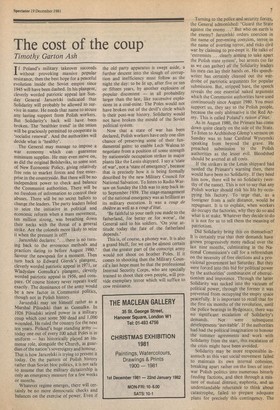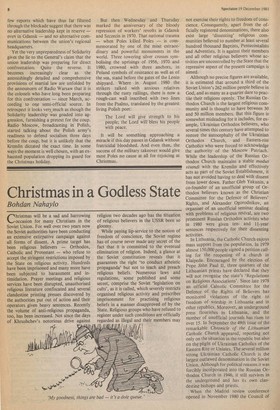The cost of the coup
Timothy Garton Ash
T f Poland's military takeover succeeds without provoking massive popular resistance, then the best hope for a peaceful evolution inside the Soviet empire since 1945 will have been dashed. In his plangent, cleverly worded patriotic appeal last Sunday General Jaruzelski indicated that Solidarity will probably be allowed to survive in name. He needs that name to secure any lasting support from Polish workers. But Solidarity's back will have been broken. The 'healthier trend' in the union will be graciously permitted to cooperate in 'socialist renewal'. And the authorities will decide what is 'healthy'.
The General may manage to impose a war economy which can guarantee minimum supplies. He may even move on, as did the original Bolsheviks, to some sort of New Economic Policy, giving relatively free rein to market forces and free enterprise in the countryside. But there will be no independent power to check and balance the Communist authorities. There will be no freedom of information to control their abuses. There will be no secret ballots to change the leaders. The party leaders failed to seize the initiative in political and economic reform when a mass movement, ten million strong, was breathing down their necks with the threat of a general strike. Are the colonels more likely to seize it when the pressure is off?
Jaruzelski declares: ...there is no turning back to the erroneous methods and practices dating to before August 1980.' Savour the newspeak for a moment. Then turn back to Edward Gierek's plangent, cleverly worded patriotic appeal in 1971, or Wladyslaw Gomulka's plangent, cleverly worded patriotic appeal in 1956, and compare. Of course history never repeats itself exactly. The dominance of the army would be a new factor in Communist politics, though not in Polish history.
Jaruzelski may see himself rather as a Marshal Pilsudski than as Gomulka. In 1926 Pilsudski seized power in a military coup which cost some 500 dead and 1,000 wounded. He ruled the country for the next ten years. Poland's huge standing army — today one out of every 100 adult Poles is in uniform — has historically played an immense role, alongside the Church, as guardian of the nation's sovereignty and honour. That is how Jaruzelski is trying to present it today. On the pattern of Polish history rather than Soviet bloc politics, it is not safe to assume that the military dictatorship is only an emergency measure for a few weeks or months.
Whatever regime emerges, there will certainly be no more democratic checks and balances on the exercise of power. Even if the old party apparatus is swept aside, a further descent into the slough of corruption and inefficiency must follow as the night the day: to be lit up, after five or ten or fifteen years, by another explosion of popular discontent — in all probability larger than the last, like successive explosions in a coal-mine. The Poles would not have broken out of the devil's circle which is their post-war history. Solidarity would not have broken the mould of the Soviet political system.
Now that a state of war has been declared, Polish workers have only one slim chance of preserving some of their fundamental gains: to enable Lech Walesa to negotiate from a position of some strength by nationwide occupation strikes in major plants like the Lenin shipyard. I say a 'state of war', not a 'state of emergency', because that is precisely how it is being formally described by the new Military Council for National Salvation. To listen to Radio Warsaw on Sunday the 13th was to step back into September 1939. The stage-management of the national emergency was as brilliant as its military execution. It was a coup de theatre as well as a coup d'etat.
'Be faithful to your oath you made to the fatherland, for better or for worse', the General said to his soldiers. 'On your attitude today the fate of the fatherland depends.' This is, of course, a phoney war. It is also a grand bluff, for we can be almost certain that the greater part of the conscript army would not shoot on brother Poles. If it comes to shooting then the Military Council's last hope must be that the professional Internal Security Corps, who are specially trained to shoot their own people, will provide exemplary terror which will suffice to cow resistance. Turning to the police and security forces, the General admonished: 'Guard the State against the enemy...' But who on earth is the enemy? Jaruzelski orders coercion in the name of preventing coercion, terror in the name of averting terror, and risks civil war by claiming to pre-empt it. He talks of 'extremists ...clearly aiming to take apart the Polish state system', but arrests (so far as we can gather) all the Solidarity leaders his men can lay their hands on. His speechwriter has certainly cleaned out the wardrobe of partriotic arguments for popular submission. But, stripped bare, the speech reveals the one essential naked argument which the Communist authorities have used continuously since August 1980. You must support us, they say to the Polish people, because the only alternative is the Red Army. This is called Poland's raison d'etat.
As in August 1980, the Primate has come down quite clearly on the side of the State. To listen to Archbishop Glemp's sermon on Sunday was to hear Cardinal Wyszynski speaking from beyond the grave. He preached submission to the Polish authorities as the lesser evil. Bloodshed should be averted at all costs.
If the strikers in the Lenin shipyard had needed the Primate's warning then, there would have been no Solidarity. If they heed him now, there will be no Solidarity (worthy of the name). This is not to say that any Polish worker should risk his life by occupying his factory. To urge that, as a foreigner from a safe distance, would be repugnant. It is to explain, when workers do occupy the factories, why they do so and what is at stake. Whatever they decide to do it is not for us to tell them the meaning of patriotism.
Did Solidarity bring this on themselves? It is certainly true that their demands have grown progressively more radical over the last nine months, culminating in the National Commission's call for a referendum on the necessity of free elections and a provisional government last Saturday. But they were forced into this bid for political power by the authorities' combination of obstructionism and impotence. Through the latter Solidarity was sucked into the vacuum of political power, through the former it was prevented from occupying the empty space peacefully. It is important to recall that for the first six months of the revolution, until the police beatings in Bydgoszcz, there was no significant escalation of Solidarity's demands. Nor were subsequent developments 'inevitable'. If the authorities had had the political imagination to honour the summer agreements and work with Solidarity from the start, this escalation of the crisis might have been avoided.
Solidarity may be more responsible inasmuch as this vast social movement failed to maintain its own internal cohesion, breaking apart rather on the lines of interwar Polish politics into numerous bitterly feuding factions, and then through a mixture of mutual distrust, euphoria, and an understandable reluctance to think about catastrophe, failed to prepare adequate plans for precisely this contingency. The few reports which have thus far filtered through the blockade suggest that there was no alternative leadership kept in reserve — even in Gdansk — and no alternative communications between the union's regional headquarters.
Yet the very unpreparedness of Solidarity gives the lie to the General's claim that the union leadership was preparing for direct confrontation. Quite the reverse. It becomes increasingly clear as the astonishingly detailed and comprehensive provisions of martial law are unfolded by the announcers of Radio Warsaw that it is the colonels who have long been preparing for this confrontation — since March, according to one semi-official source. In retrospect it looks very much as though the Solidarity leadership was goaded into aggression, furnishing a pretext for the coup. Radio Moscow, broadcasting in Polish, started talking about the Polish army's readiness to defend socialism three days before the coup, but it is unlikely that the Kremlin dictated the exact time. In some ways the moment is well chosen, with an exhausted population dropping its guard for the Christmas holiday. But then Wednesday and Thursday marked the anniversary of the bloody repression of workers' revolts in Gdansk and Szczecin in 1970. That national trauma — when Poles killed Poles — is commemorated by one of the most extraordinary and powerful monuments in the world. Three towering silver crosses symbolising the uprisings of 1956, 1970 and 1980, crowned with three anchors, in Poland symbols of resistance as well as of the sea, stand before the gates of the Lenin shipyard. Where in August 1980 the strikers talked with anxious relatives through the rusty railings, there is now a rough-cast wall inscribed with two lines from the Psalms, translated by the greatest living Polish poet: The Lord will give strength to his people; the Lord will bless his people with peace.
It will be something approaching a miracle if this day passes in Gdansk without fratricidal bloodshed. And even then, the success of the military takeover would give most Poles no cause at all for rejoicing at Christmas.



































































 Previous page
Previous page